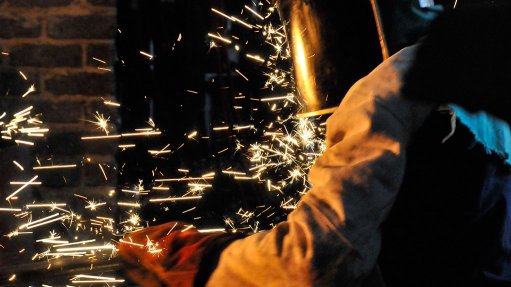
SKILLS DEVELOPMENT
Prima offers apprentice training for personnel core to the operation of a foundry
Photo by: Dylan Slater
The on-the-job training programme of the New Foundry Generation Forum (NFGF) has empowered Benoni-based foundry Prima Industrial technical manager Cypi Kyalu to embrace new techniques and industry cooperation.
He participated in the NFGF programme last year.
“The NFGF is especially important to the young generation of foundrymen, because the current situation is an industry almost entirely dominated by an older generation which may be nearing retirement age,” says Kyalu, adding that there are almost no middle-age industry professionals to speak of.
Kyalu tells Engineering News that the NFGF is a “great programme” that should continue and that it should receive more support, as there are only a few avenues of encouragement for young foundrymen to pursue careers in the foundry industry.
The NFGF also serves to ensure the sustainability and survival of the foundries industry into the future, he adds.
Further, Kyalu notes the NFGF’s important role of opening industry up by creating a sense of like-minded cooperation between companies. “In the past, many foundry companies were reluctant to share information for fear of trade secrets being revealed or competitive advantage being lost,” he notes.
He says that most of the younger generation have the wrong perception about the foundries industry. “Their common [understanding] is that foundries are dirty and unsafe environments,” says Kyalu, adding that foundries are just like any other company, contributing greatly to the economy of South Africa.
Prima Industrial human resources manager Eric Molaudzi says human capacity develop- ment problems stem from school level, where students are not encouraged to study the core subjects essential for an industry like the foundry industry – subjects that include mathematics and science.
To further skills development internally and externally, Prima offers apprentice training for personnel core to the operation of a foundry, including electricians, fitters, moulders, patternmakers and melters. Prima Industrial currently has four melters undergoing an internship at its foundry.
Moreover, to enhance the basic skills of its staff, Prima Industrial is embarking on Adult Basic Education and Training programmes, in which 50 personnel participated last year. Several Prima Industrial personnel are also attending training sessions, over weekends, hosted by the South African Institute of Foundrymen.
Resource Decline Hits Industry
Meanwhile, the recent crash of commodity prices is negatively affecting production at Prima Industrial.
The company has been supplying South African mines with premium-grade mining-wear parts since 1937.
Prima Industrial operations director Will Price says some commodity prices have dropped by as much as 50%, leading to decreased demand downstream of foundry manufacturing.
The mining and metals industry strikes of 2014 have also severely impacted on the foundry industry, especially from an international perspective, as they damaged the perception of the local foundry industry, says Price.
“Many overseas customers were shocked and worried about the consistency of manufacturing and the quality of supply during the period of the strikes,” he adds.
From a local perspective, the industry had a common understanding of the issue, notes Price, adding that many companies worked harder for several months after the strikes to get back-orders out and to accelerate a return to sustainable production.
However, he notes that a month’s lost production is lost forever and some clients may find products elsewhere.
For Prima Industrial, it took about three months to recover after the strikes.
Enhancing Production
About eight years ago, Prima Industrial installed a new foundry to increase production and recently ordered a new sand reclamation facility to improve the quality of sand and increase the reuse thereof.
“The equipment is on site awaiting installation of secondary sand reclamation equipment,” says Price.
Prima Industrial is one of a handful of foundries in South Africa that uses 100% chrome sand in the moulding process. “Our use of this sand encouraged us to reclaim as much of the used sand as possible and to continually recondition it for future use,” he says.
The reclamation plant will decrease the volume of new sand required and increase the quality of sand already in the system.
Further, Price tells Engineering News the plant will also provide an additional 5 t of sand an hour to Prima Industrial’s current system.